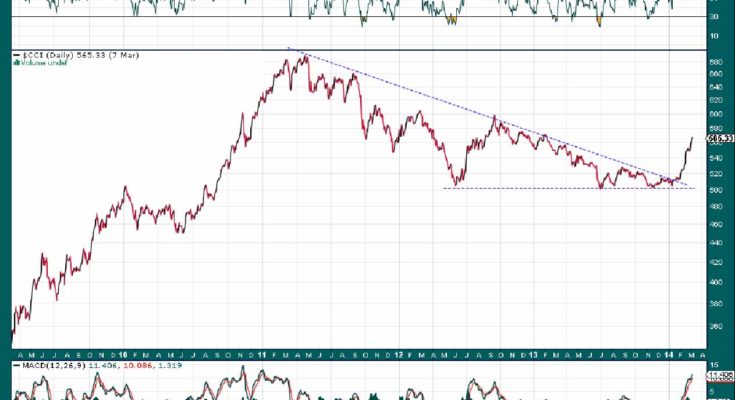A Dichotomy Develops in Commodities Prices
Recently, the CCI (continuous commodities index/ equal-weighted CRB) has broken above a downtrend line, and delivered a brisk advance:

The CCI breaks out to the upside – somewhat surprisingly – click to enlarge.
We last discussed the futures markets and commodities in general on March 3, taking a look at the biggest winners that have emerged so far this year. As we remarked in closing on that occasion:
“Quite a few commodities have ‘woken up’ this year, but there is nothing that indicates that the market’s views about global economic growth have improved. On the contrary, economically sensitive copper is one of the biggest losers year-to-date. Mostly the rallies seem weather-related, or are actually tied to signs of economic weakness rather than strength (gold, treasuries). The big exception in the industrial commodity space is crude oil, which has strengthened markedly again (natural gas prices have been driven by the cold weather as well). Crude oil inventories have recently delivered a few downside surprises, so the strength seems largely related to supply issues.â€
In the meantime, this dichotomy has become even more pronounced. A number of slightly worrisome news emanated from China. It started with reports of a small, but meaningful corporate bond default in the ‘solar energy’ space (it was meaningful because no bailout was provided this time). Chaori Solar, which on a previous occasion could still count on a local government bailout, was left hanging this time. Interestingly, analysts aren’t taking the event seriously. Faith in the power of the planners to keep things under control evidently remains extremely high. For instance, the FT writes that:
China’s first corporate bond default is a symbolic moment in the country’s financial development, but analysts have downplayed suggestions it will herald a wave of further failures across the country.
On Friday, Chaori Solar became the first company in recent history to default on its bonds after it failed to make an interest payment. Some have expressed fears that the Chaori default could create a domino effect where investors quit the bond market altogether, sparking a liquidity squeeze or a credit crunch.
[…]
Rather than billing Chaori as an alarm bell in the credit markets, many analysts see it as a trial balloon being floated by the authorities as they seek ways to cut overcapacity in certain sectors of the economy.
“The government is trying to send a signal to the market that there are risks to buying investments. They are doing it carefully,†said Christopher Lee at Standard & Poor’s. “This company is so small and in trouble anyway – even if it defaults it is not going to impact the market much.â€
Not going to impact the market much? If that’s so, then someone forgot to tell the copper market, which went into free-fall in the wake of the news. This was exacerbated further by China posting a rare trade deficit in February,mainly due to tumbling exports. This actually tells us more about the economic health of China’s trading partners than that of China, but still, it was apparently interpreted as quite a negative surprise by the markets. Chinese stocks were incidentally under pressure again as well, but the low made last year continues to hold so far.

